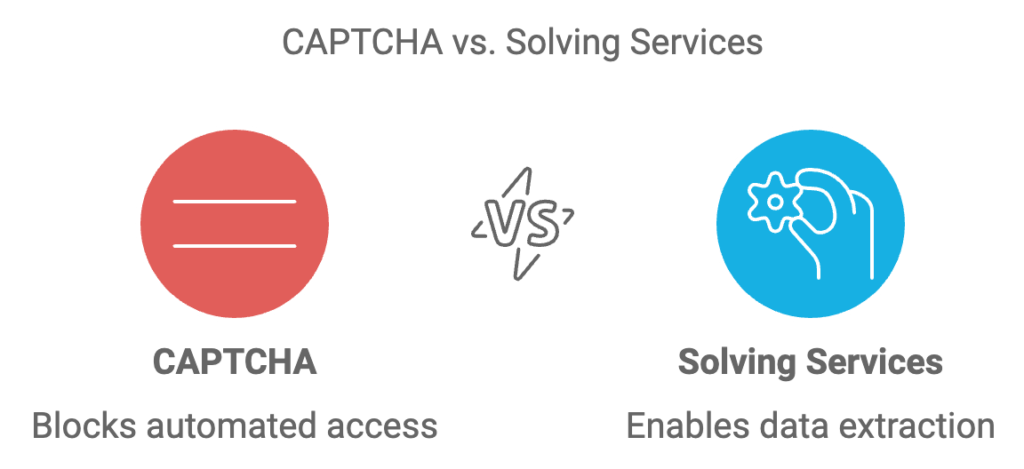Introduction:
In the realm of web scraping, one of the most formidable challenges is dealing with CAPTCHAs (Completely Automated Public Turing test to tell Computers and Humans Apart). These security measures are designed to prevent scripts from accessing websites, thereby protecting against spam, abuse, and unauthorized data extraction. However, the advent of CAPTCHA-solving services has introduced a new dimension to web scraping, allowing for more sophisticated data extraction strategies.

Understanding CAPTCHA-Solving Services:
- Definition:
- CAPTCHA-solving services are platforms or APIs that provide solutions to CAPTCHAs, often using human labor, machine learning, or a combination of both. These services are employed by web scrapers to bypass CAPTCHA challenges automatically.
- Operational Mechanism:
- Human-Based Solutions: Some services employ human workers to solve CAPTCHAs in real-time, which is highly effective but can be costly and slower.
- Machine Learning Models: Advanced services use machine learning algorithms trained on vast datasets of CAPTCHA images to recognize and solve them autonomously.
Machine Learning in CAPTCHA Solving:
- Training Models:
- CAPTCHA-solving services often train deep learning models, particularly Convolutional Neural Networks (CNNs), on datasets containing thousands of CAPTCHA images. These models learn to recognize patterns in CAPTCHA images, including distorted text, noise, and background variations.
- Fine-Tuning with Decision Trees:
- Weka Decision Tree: For more nuanced classification, services might employ tools like Weka, which can use decision tree algorithms. Decision trees help in categorizing CAPTCHA types or solving strategies based on features like image complexity, text style, or background noise.
- Process:
- Data Collection: Gather a diverse set of CAPTCHA images.
- Feature Extraction: Identify relevant features (e.g., color distribution, edge detection, character segmentation).
- Training: Use Weka to train a decision tree model on this data, where each branch could represent a decision on how to approach solving a particular CAPTCHA type.
- Integration: The trained model’s output can then be used to dynamically select the best solving strategy or to directly attempt solving the CAPTCHA.
- Weka Decision Tree: For more nuanced classification, services might employ tools like Weka, which can use decision tree algorithms. Decision trees help in categorizing CAPTCHA types or solving strategies based on features like image complexity, text style, or background noise.
- Database Integration:
- Once a CAPTCHA is solved, its solution, along with metadata like the type of CAPTCHA, solving method, and success rate, can be stored in a database. This database becomes a reference for future CAPTCHA challenges, improving efficiency and accuracy over time.
Lessons from Imperfect Accuracy
While CAPTCHA-solving services can achieve high accuracy rates, they are not infallible. In some cases, misclassified CAPTCHAs can occur, leading to errors or failed attempts. To improve the CAPTCHA-solving model, it’s essential to save the mismatched images for further research and manual verification. This process allows for the identification of patterns or weaknesses in the model, enabling refinement and improvement over time. By acknowledging the potential for imperfections and actively working to address them, web scrapers can develop more robust and effective CAPTCHA-solving strategies.
Case Studies
To provide valuable insights and practical applications, let’s discuss some case studies showcasing successful and unsuccessful CAPTCHA-solving strategies:
Case Study 1: E-commerce Web Scraping
A popular e-commerce website used reCAPTCHA to protect its product data from unauthorized extraction. A CAPTCHA-solving service employing human labor and machine learning models was integrated into the web scraping workflow. The service achieved high accuracy for most CAPTCHAs but encountered difficulties in solving distorted text or complex images with low contrast. The misclassified CAPTCHAs were saved in a database for further research and manual verification. By analyzing these misclassified images, the CAPTCHA-solving model was fine-tuned, and the overall accuracy improved.
Case Study 2: News Aggregator Web Scraping
A news aggregator website needed to scrape multiple news sources protected by CAPTCHAs. The web scraping team used a CAPTCHA-solving service based on deep learning models trained on thousands of CAPTCHA images. By using a decision tree algorithm like Weka, the service categorized CAPTCHAs based on features like image complexity and background noise. This approach significantly improved the solving rate, allowing the news aggregator to extract data efficiently.
Implications for Web Scraping
- Efficiency: CAPTCHA-solving services significantly reduce the time and complexity involved in scraping websites that employ CAPTCHAs, allowing for more continuous and automated data extraction.
- Ethical and Legal Considerations: The use of these services raises ethical questions about bypassing security measures and potential legal issues regarding terms of service violations on websites.
- Cost vs. Benefit: While these services can be expensive, they might be justified for large-scale scraping operations where manual intervention would be impractical.
- Technological Arms Race: As CAPTCHA technologies evolve, so must the solving services, leading to a continuous cycle of innovation in both security and circumvention techniques.
Conclusion:
The integration of CAPTCHA-solving services into web scraping workflows represents a significant advancement in automated data extraction technologies. By leveraging machine learning, particularly through sophisticated training models and decision tree algorithms like those implemented in Weka, these services not only enhance the capabilities of web scrapers but also push the boundaries of what’s possible in automated interaction with web services. However, this development also underscores the need for a balanced approach, considering ethical implications and the ongoing evolution of web security measures. As web scraping continues to evolve, understanding and responsibly using CAPTCHA-solving services will remain a critical skill for those aiming to establish topical authority in this dynamic field.
Related Articles: